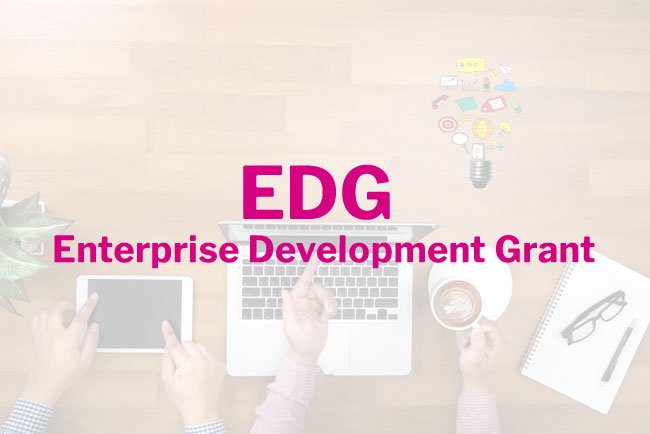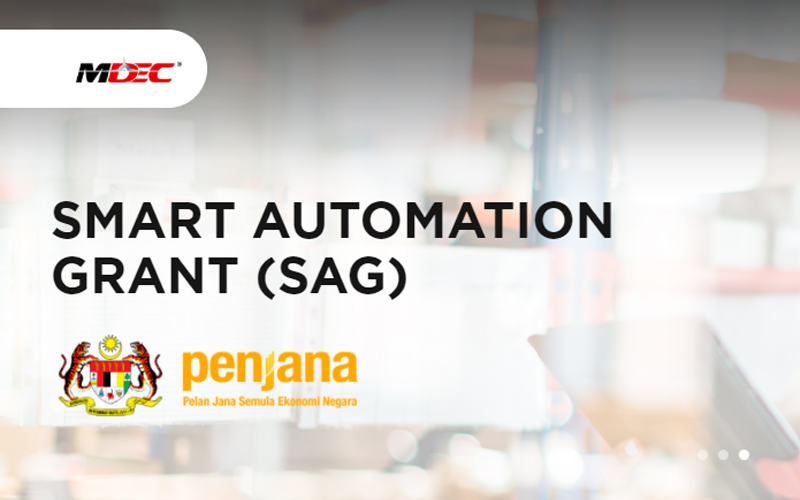How Enterprise Development Grant (EDG) Can Supercharge Singaporean Companies During Recession? Now more than ever, companies that foster are the ones that have well-connected teams, powerful business strategies, think innovatively, adapt the latest technology and reach the audience globally. This is where Enterprise Development Grant (EDG) comes to the rescue, a program offered by Enterprise Singapore (ES) to support companies in the journey of becoming successful. The EDG provides all-inclusive support to businesses who wish to thrive, innovate, venture overseas, or are set to go on board on any combination of these tactics. Since unprecedented coronavirus pandemic has adversely affected many sectors, recently, the maximum support level of EDG has been increased by up to 90% which means Singaporean SMEs can gain up to 90% government grants to meet the expenses of qualifying projects. Still, wondering what exactly is Enterprise Development Grant (EDG)? How it can assist with companies’ expansion? Read on to attain a clear understanding. What is the Enterprise Development Grant (EDG)? The Enterprise Development Grant (EDG) is a program managed by Enterprise Singapore (ES) to help Small and Medium Enterprises (SMEs) in Singapore to create a strong business foundation, use advanced practices, and boost productivity, by offering them financial grants. It is created by combining two previous grants i.e. the Capability Development Grant (CDG) and the Global Company Partnership (GCP). The original EDG defrays up to 30% to 70% of qualifying project expenses, vary depending on whether it is a Small Medium Enterprise (SME) or finances are required for software and equipment. However, to lessen the negative impact on companies due to the COVID-19 outbreak, the Enterprise Singapore (ES) has announced that the subsidy will meet up to 80% of the costs depending on cases that will remain valid until December 31, 2020. And those companies who have shattered by the novel coronavirus will qualify for 90% grant support. The Three Core Pillars of Enterprise Development Grant (EDG) The grant gives optimum support to projects that help companies to strengthen their business foundations and improve efficiency under the three pillars, that include: 1. Core Capabilities Project under the category of Core Capabilities support companies for increased growth by strengthening and stabilising their business foundations. The projects basically involve: Business Strategy Development Building a new set of business strategies that bring better opportunities and give a competitive edge over others. Enhance research and development activities. Improve management systems with the Business Excellence Framework to obtain the ‘Singapore Quality Class’ certification. Financial Management The purpose here is to analyse companies’ financial stability to facilitate corporate growth and prepare their management teams with the necessary skills. The projects include: Developing proven strategies to drive profitable investments. Risk exposure evaluation and use of risk management procedure. Human Capital Development The aim here is to improve Human Resource (HR) capabilities of companies to make the best out of business expansion tactics. The projects include: Reshaping Human Resource (HR) management. Offering compensation and benefits. Assisting with the skill development of the workforce. Service Excellence The objective here is to enhance the delivery services of companies by attaining a clear knowledge of consumers’ needs, behaviour, and decision-making procedures. The projects include: Evaluation of customers’ requirements and decision-making strategies. Applying genuine service delivery tactics to enhance the customer experience. Strategic Brand and Marketing Development It serves the purpose of helping companies to attract the potential target audience and various markets more effectively by distinguishing between brands, products/ or services. The projects cover: Development of impeccable brand strategies focused on a unique selling perspective to reach customers. Advancement of business marketing and communication plans. 2. Innovation and Productivity Projects under the category of Innovation and Production allow companies to discover diverse areas of expansion or seek strategies to boost efficiency. This can cover examination and reshaping workflows and procedures. Companies can also use automation and technology to ease their everyday tasks. The projects involve: Automation Companies can opt for automation tools like ERP software to simplify their business processes, create daily operations more productive, and attain real-time insights into their businesses with a constant focus on growth. Process Redesign Before taking advantage of automation, companies are advised to optimise their existing business procedures and determine certain areas to enhance productivity. Product Development Companies are motivated to innovate and renovate themselves to develop efficient products for commercial usage. 3. Market Access Projects under the category of Market Access support Singapore companies that are willing and prepared to expand overseas. In such cases, companies can utilise Enterprise Development Grant (EDG) to help cover some of the costs of thriving into overseas markets. The projects involve: Mergers and Acquisitions (M&A) This may be in the planning, assessment of potential mergers and/or acquisition or post-M&A staThis covers planning, evaluation of possible mergers and acquisitions, or post-M&A stage integration. Overseas Marketing Presence (OMP) The main is to support companies to grow into new markets by establishing a presence overseas to begin marketing and business development operations. Pilot Project and Test Bedding The goal is to support companies to grow into new geographical or product markets by setting their track records. Standards Adoption The purpose is to support companies to adopt internationally-claimed standards and certifications in respected industries, as well as new and developing sectors. How EDG is Different from CDG and GCP? Previously, the Capability Development Grant (CDG) offered by SPRING Singapore was designed to support companies in capability development. On the other hand, the Global Company Partnership (GCP) grant offered by International Enterprise Singapore (IE) was established to help companies reach overseas. The Enterprise Development Grant (EDG) is a single grant that offers complete help to companies who want to upgrade, strengthen their goals, and venture overseas. As we have discussed, the supported projects meet a wide scope under three main pillars – Core Capabilities, Innovation and Productivity, and Market Access. Who is Eligible to Apply for the EDG? Companies with the strong financial background are certainly eligible to apply for the Enterprise Development Grant (EDG), however, they are required to meet
The Malaysia Digital Economy Corporation (MDEC) announced the Smart Automation Grant (SAG) under Pelan Jana Semula Ekonomi Negara (PENJANA) initiative, which is primarily intended to support companies in order to make a digital jump and to recover from the impact of unprecedented coronavirus pandemic. This way, Small and Medium Enterprises (SMEs) can leap into the digital path and grow their digital capabilities to contribute more to the innovation and economy. According to IDC’s infographic, SMBs with legacy systems need to realise the peace of mind cloud Enterprise Resource Planning (ERP) offers and start planning to embrace digital transformation. Since SAG will be used solely to develop and implement a project that increases the adoption of technologies to automate business tasks, acquiring advanced ERP solution could be a feasible option to manage your company’s data and processes under a single database, no matter wherever you are. WHAT IS THE SAG? SAG stands for Smart Automation Grant, a plan of PENJANA which is a specific matching grant for services companies that will allow them to automate their business processes and step ahead in the sphere of digitalisation. Under this grant, each successful application will get up to 50% of the total project cost, pertaining to a ceiling limit up to RM200,000 or, whichever is the lowest. This matching grant currently focuses on the service industry, including transportation, retail, wholesale, food and beverages, logistics, healthcare, real estate, financial services, and much more. It is aimed at assisting services companies embarking on automation to accomplish an increase in revenue, reduction of the process time cycle, reduce human errors, significant savings in business cost, and bring new opportunities for growth. To be eligible for SAG, the companies must meet the following criteria: Incorporated in Malaysia under the Companies Act 1965 and the Companies Act 2016. Have an issued and paid-up capital of at least RM50,000. Have a minimum of 51% equity held by Malaysian(s). Should not be a subject of liquidation, winding up or bankruptcy order. Have no ongoing issue or dormant. Have entered into a written contract or committed plan with the technology partner for the expansion and execution of the project. If received any MDEC/government grant in the past, the applicant needs to demonstrate the completion and success of the funded project(s). How SMEs can Shift to Digital Transformation through Acumatica ERP Software? Many Small and Medium Enterprises (SMEs) still uses an on-premise system which lacks in terms of flexibility, performance, and functionality. Such systems require manual input and experience complications in synchronising data. SMBs can use the Acumatica ERP system to embrace digital transformation and increase their chances of success. Acumatica ERP software is designed on a cloud-based solution that allows users to control and monitor business information smoothly and effectively from anywhere, anytime. A highly functional ERP system allow users to manage all facets of business such as accounting, production runs, distribution, finance, inventory management, projects, scheduling, order modifications, and so on. It eradicates extensive paperwork and seamlessly provides updates regarding sales, services, orders, and other areas with visibility into your requisition process. Acumatica Cloud ERP can drive valuable customer relations and growth in a range of industries such as manufacturing, service industries, construction, retail and e-commerce, distribution, and more. With high flexibility, regular product updates, and multiple data storage locations, companies can manage workflows seamlessly and give the best shot at success. Is it a Viable Option to Use SAG for Acumatica ERP Software Purchase?Businesses and communities looking for reliable support within the digital space should take PENJANA SAG as an opportunity and purchase the Acumatica ERP system to deliver data across organisation and manage workflows automatically. Irrespective of the background and nature of the business, everyone can be a leading part of the digital ecosystem through an ERP solution and can recover from complex business situations. It gives an intelligent core to connect both internal and external resources under a single database to thrive in the digital era. This will give your business a much-needed boost to regain lifestyle, excel at the present, and look confidently to the future.

